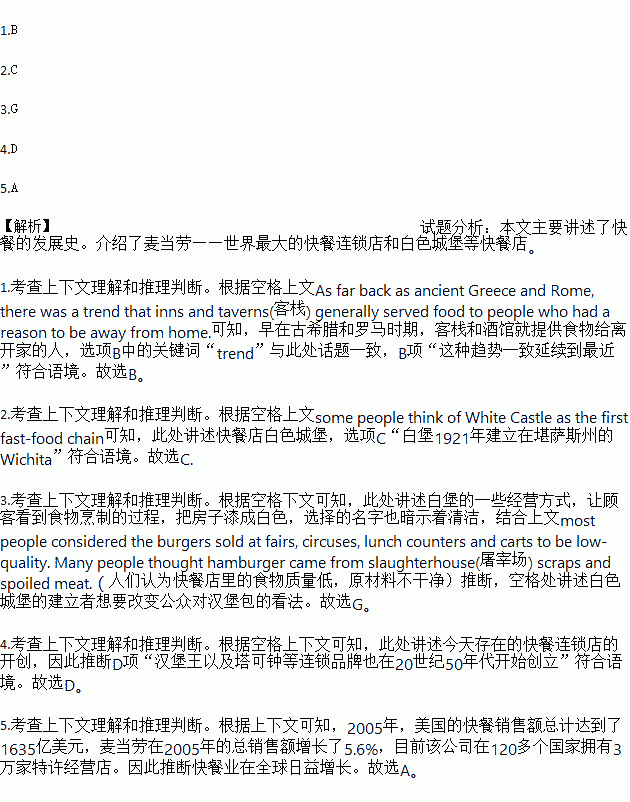题目内容
Restaurants have been around in some form for most of human civilization. As far back as ancient Greece and Rome, there was a trend that inns and taverns(客栈) generally served food to people who had a reason to be away from home. 1. Although taverns and coffee houses were popular places to gather and share beverages in the 17th century, the idea of eating out for fun didn’t take off in Western society until the late 18th century.
Although McDonald’s was the first restaurant to use the assembly-line system, some people think of White Castle as the first fast-food chain. 2. At the time, most people considered the burgers sold at fairs, circuses, lunch counters and carts to be low-quality. Many people thought hamburger came from slaughterhouse(屠宰场) scraps and spoiled meat.
3. They built their restaurants so that customers could see the food being prepared. They painted the buildings white and even chose a name that suggested cleanliness. White Castle was most popular in the American East and Midwest, but its success helped give hamburger meat a better reputation nationwide.
The McDonald brothers opened their redesigned restaurant in 1948, and several fast-food chains that exist today opened soon after. 4. And Wendy’s opened in 1969. McDonald’s is now the world’s largest fast-food chain.
According to the National Restaurant Association, American sales of fast food totaled $163.5 billion in 2005. 5. Total sales for McDonald’s grew 5.6 percent in 2005, and the company now has 30,000 franchised stores in more than 120 countries.
A. The industry is growing globally as well.
B. This trend continued until relatively recently.
C. White Castle was founded in 1921 in Wichita, Kansas.
D. Burger King and Taco Bell got their start in the 1950s.
E. It’s hard to imagine fast food without drive-through windows.
F. It allows restaurants to receive and store a large amount of food.
G. White Castle’s founders decided to change the public’s perception of hamburgers.
 阅读快车系列答案
阅读快车系列答案Global English Center General English in all four skills: listening, speaking, reading and writing. * 3-month (700 yuan ), 6-month (1,200 yuan ) and one-year (2,000 yuan) courses. * Choice of morning or evening classes, 3 hours per day, Mon. -- Fri. * Experienced college English teachers. * Close to the city center and bus stops Add: 105 Zhongshan Road Tel: 6760000 |
Modern Language School * Special courses in English for business, travel, banking, hotel management and office skills. * Small classes (12~16 students ) on Saturday and Sunday from 2:00 to 5:00 p.m.. * English teachers from Canada and the USA. * 3-month (1,000 yuan), 6-month (1,800 yuan). Add: 675 Park Road Tel: 6777777 |
The 21st Century English Training Center * We offer morning or afternoon classes. Both of which last three months and a half at a cost of 800 yuan. Entrance exams: June 1 and December 1. * We also have a six-week TOEFL preparation class during winter and summer holidays * Only 15-minute walk from city center. Call 6016666 for more information. |
The International House of English * 3-or 6-month English course for students of all levels at very low cost: 60 yuan for 12 hours per week; convenient class hours: 9:00~12:00 a.m. and 2:00~5:00 p.m. * 4-month evening classes for developing speaking skills(same cost as day classes) * Well- trained foreign teachers * Free sightseeing tours and social activities * Very close to the Central Park. Call 6886666 for further information. |
1. offers free sightseeing tours.
A. Global English Center
B. Modern Language School
C. The 21st Century English Training Center
D. The International House of English
2.How much do you have to pay if you want to learn English in Modern Language School for six month?
A. 800.
B. 1,000.
C. 1,200.
D. 1,800.
3.Why is The 21st Century English Training Center different from others?
A. It has an entrance exam for learners.
B. It is the nearest to the city enter.
C. Its address doesn’t appear in the advertisement.
D. The teachers are from Canada and the USA.
4.You should call if you want to improve reading and writing skills.
A. 6760000
B. 6777777
C. 6016666
D. 6886666

